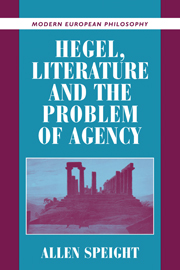Book contents
- Frontmatter
- Contents
- Acknowledgments
- Introduction
- 1 “Hegel's Novel”: The Phenomenology of Spirit and the Problem of Philosophical Narrative
- 2 Tragedy and Retrospectivity: Hegel's Antigone
- 3 Comedy and Theatricality: Desire, Bildung, and the Sociality of Agents' Self-Knowledge
- 4 Forgiveness and the Romantic Novel: Contesting the Beautiful Soul
- 5 From the Phenomenology to the Philosophy of Right: Hegel's Concept of the Will and the Possibility of Modern Ethical Life
- Selected Bibliography
- Index
1 - “Hegel's Novel”: The Phenomenology of Spirit and the Problem of Philosophical Narrative
Published online by Cambridge University Press: 18 November 2009
- Frontmatter
- Contents
- Acknowledgments
- Introduction
- 1 “Hegel's Novel”: The Phenomenology of Spirit and the Problem of Philosophical Narrative
- 2 Tragedy and Retrospectivity: Hegel's Antigone
- 3 Comedy and Theatricality: Desire, Bildung, and the Sociality of Agents' Self-Knowledge
- 4 Forgiveness and the Romantic Novel: Contesting the Beautiful Soul
- 5 From the Phenomenology to the Philosophy of Right: Hegel's Concept of the Will and the Possibility of Modern Ethical Life
- Selected Bibliography
- Index
Summary
The narrative shape of Hegel's philosophy of agency has its origins most visibly in the philosophical project of his earliest published book, the Phenomenology of Spirit. Readers of Hegel have frequently turned to the PhG as a place to begin a consideration of his view of agency, yet there has been anything but a consensus about what the work offers in that regard. Scholars have disagreed about what the book is doing and even about whether it can be said to have a coherent unified philosophical project at all: the scholarly literature concerning Hegel's intentions for the work has had to sort through a series of unusually vexing problems, including evident changes in the book's title, organizational structure, and intended relation to Hegel's Logic and the rest of his (newly emerging) philosophical system.
The problem of seeing an overarching unity to the PhG's project was perhaps most famously stated by Rudolf Haym, who claimed that the project he thought was evident at the start of the work (providing a “transcendental-psychological proof” of the reality of absolute cognition) is one that was “confused” by a second order of proof involving a concern with concrete historical data. Readers of the PhG since Haym have, in fact, often been drawn into one of two camps: those who have been most concerned to work through the claims to systematic connection particularly implicit in the work's original title (“The Science of the Experience of Consciousness”) and those who have been drawn to the text's “anthropological” concerns with history, social structure, and religion.
- Type
- Chapter
- Information
- Hegel, Literature, and the Problem of Agency , pp. 11 - 41Publisher: Cambridge University PressPrint publication year: 2001



